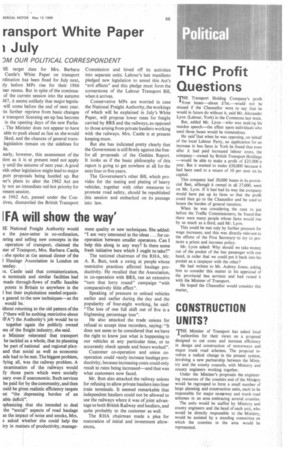I FA will show the way'
Page 57

If you've noticed an error in this article please click here to report it so we can fix it.
IE National Freight Authority would e the pace-setter in co-ordination, !ering and selling new concepts in the operation of transport, claimed the gter of Transport, Mrs. Barbara Castl4 t she spoke at the annual dinner of the Haulage Association in London on iesday.
rs. Castle said that containerization, in terminals and similar facilities had made through-flows of traffic feasible points in Britain to anywhere in the but their exploitation needed organiz s geared to the new techniques—as the would be.
ithout returning to the old pattern of the ("there will be nothing restrictive about IFA") the Authority's job would be to together again the publicly owned ins of the freight industry, she said.
t Minister reiterated that transport be tackled as a whole, that its planning be part of national and regional planand that social as well as economic nds had to be met. The biggest problem, ^lying all, was the railway problem. A examination of the railways would fy those parts which were socially sary even if uneconomic. Such services be paid for by the community, and then ould be given realistic efficiency targets tut "the depressing burden of an able deficit".
w hasizing that she intended to deal the "social" aspects of road haulage as the impact of noise and smoke, Mrs.
e asked whether she could help the try in matters of productivity, manage ment quality or new techniques. She added: "I am very interested in the ideas. . for cooperation between smaller operators. Can I help this along in any way? Is there some fresh initiative here which I ought to take?"
The national chairman of the RHA, Mr. A. R. Butt, took a swing at people whose restrictive practices affected haulage productivity. He recalled that the Association, in co-operation with BRS, ran an extensive "turn that lorry round" campaign "with comparatively little effect".
Speaking of pressure to unload vehicles earlier and earlier during the day and the popularity of four-night working, he said: "The loss of one full shift out of five is a frightening percentage loss".
He also attacked the trade unions for refusal to accept time recorders, saying: "It does not seem to be considered that we have the right to know just what is happening to our vehicles at any particular time, or to accurately check speeds and hours worked".
Customer co-operation and union cooperation could vastly increase haulage productivity, because increasing costs could only result in rates being increased—and that was what customers now faced.
Mr. Butt also attacked the railway unions for refusing to allow private hauliers into liner train terminals. It seemed remarkable that independent hauliers could not be allowed to use the railways where it was of joint advantage to both British Railway and hauliers, and quite probably to the customer as well.
The RHA chairman made a plea for restoration of initial and investment allowances,




















































































































































